Unit 2 How often do you exercise? Section B (2a~2e) 课件(共27张PPT,内嵌视频)
文档属性
| 名称 | Unit 2 How often do you exercise? Section B (2a~2e) 课件(共27张PPT,内嵌视频) | 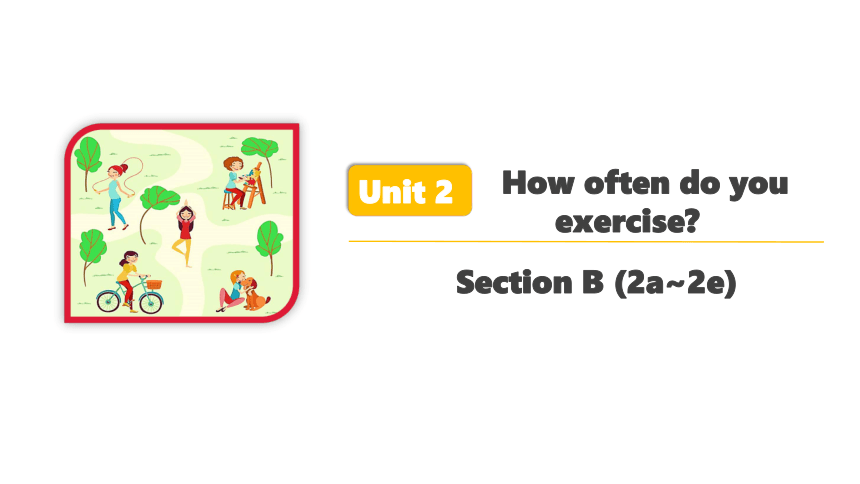 | |
| 格式 | pptx | ||
| 文件大小 | 23.4MB | ||
| 资源类型 | 教案 | ||
| 版本资源 | 人教新目标(Go for it)版 | ||
| 科目 | 英语 | ||
| 更新时间 | 2022-07-24 11:25:07 | ||
图片预览

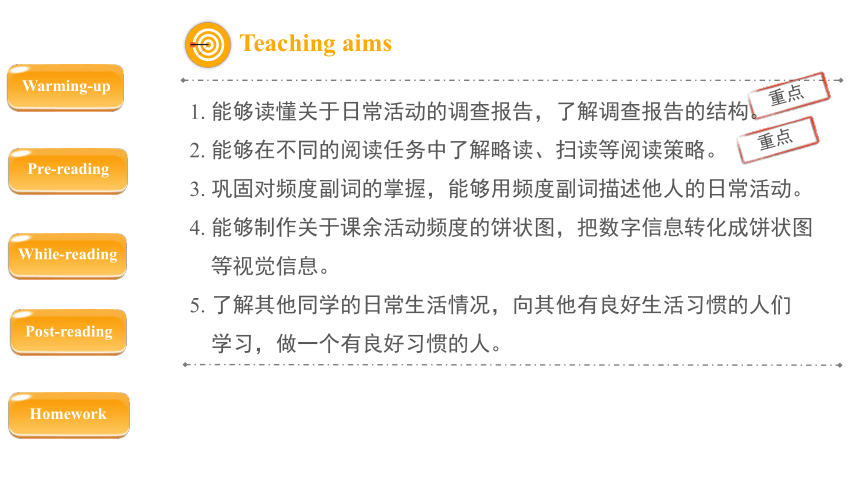
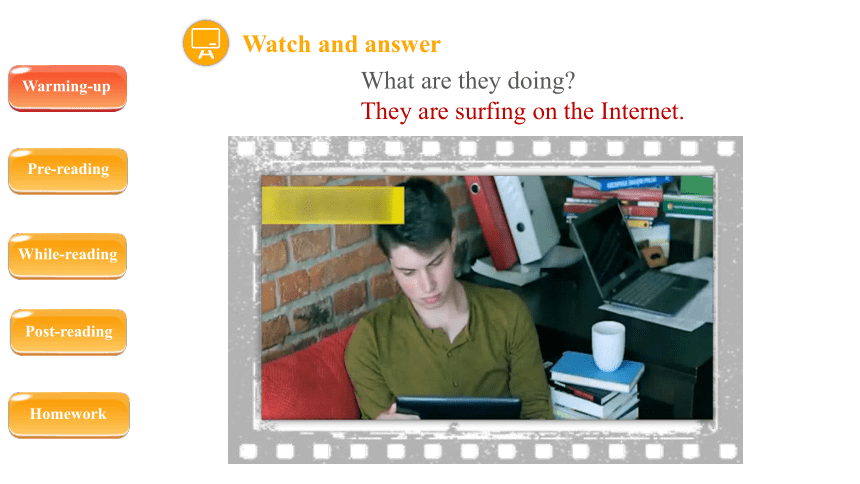
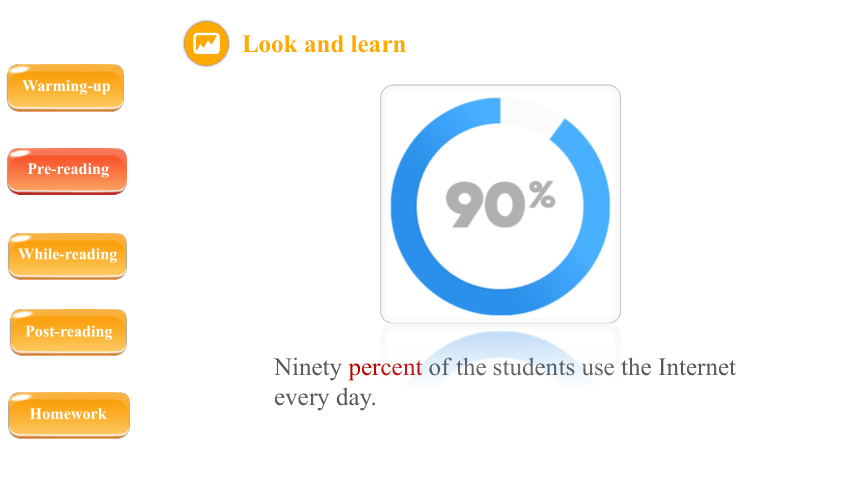
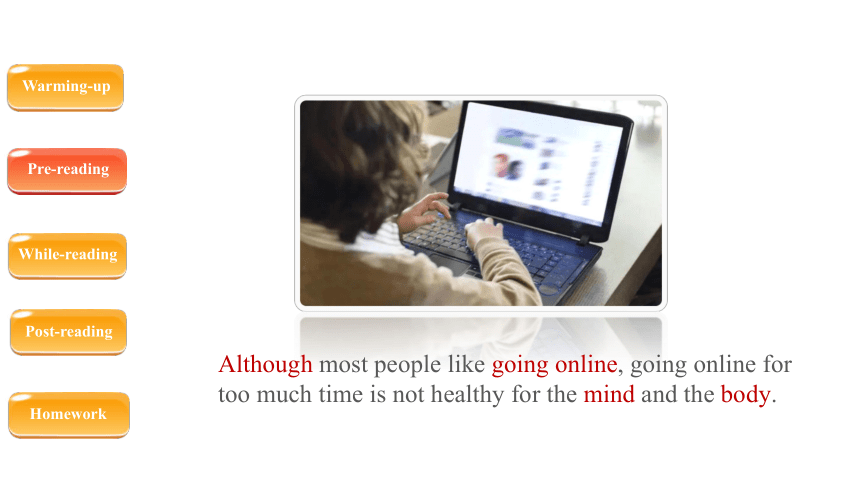
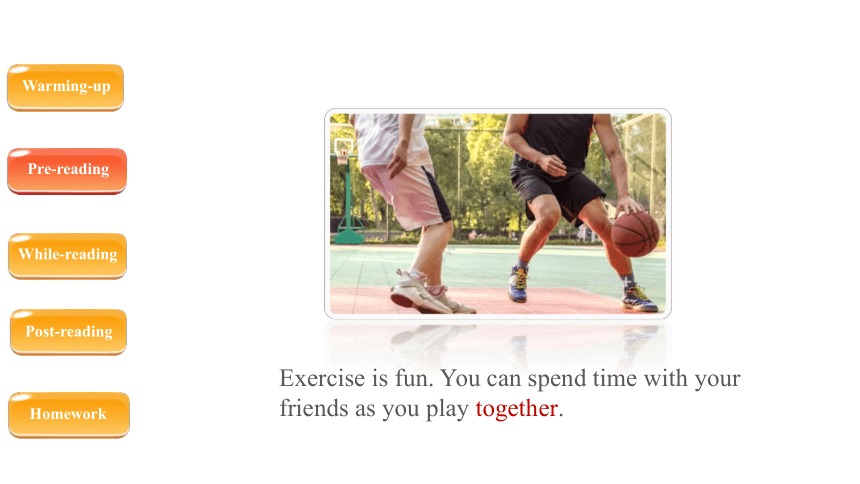

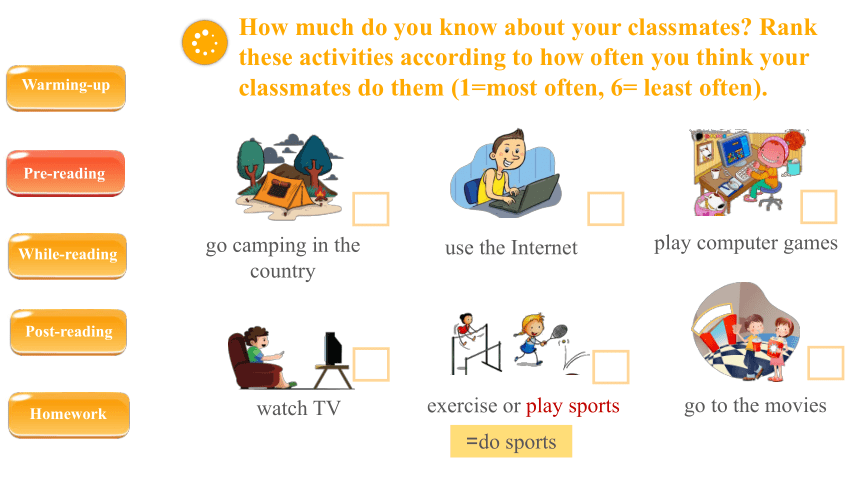
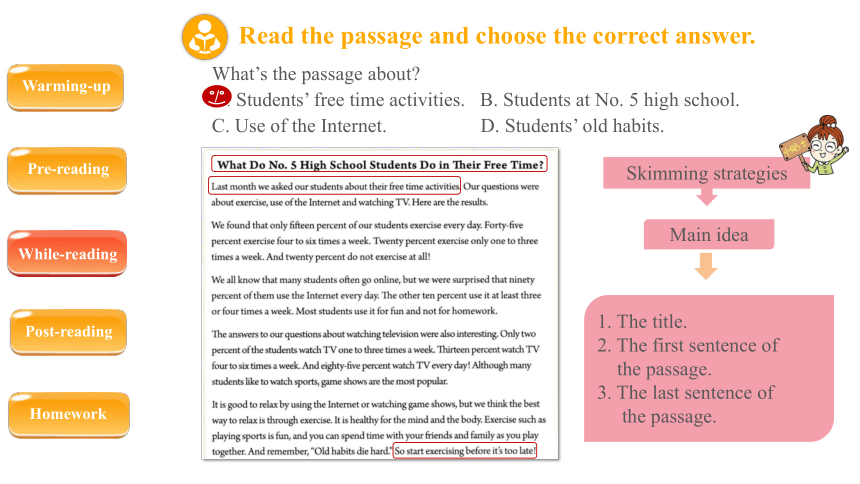
文档简介
(共27张PPT,内嵌视频)
Section B (2a~2e)
How often do you exercise
Unit 2
1. 能够读懂关于日常活动的调查报告,了解调查报告的结构。
2. 能够在不同的阅读任务中了解略读、扫读等阅读策略。
3. 巩固对频度副词的掌握,能够用频度副词描述他人的日常活动。
4. 能够制作关于课余活动频度的饼状图,把数字信息转化成饼状图
等视觉信息。
5. 了解其他同学的日常生活情况,向其他有良好生活习惯的人们
学习,做一个有良好习惯的人。
重点
Teaching aims
While-reading
Homework
Post-reading
Pre-reading
Warming-up
重点
While-reading
Warming-up
Homework
Post-reading
Pre-reading
What are they doing
They are surfing on the Internet.
Watch and answer
While-reading
Homework
Post-reading
Pre-reading
Warming-up
Look and learn
Ninety percent of the students use the Internet every day.
While-reading
Homework
Post-reading
Pre-reading
Warming-up
Although most people like going online, going online for too much time is not healthy for the mind and the body.
While-reading
Homework
Post-reading
Pre-reading
Warming-up
Exercise is fun. You can spend time with your friends as you play together.
While-reading
Homework
Post-reading
Pre-reading
How often do you think your classmates go online
Free talk
Warming-up
How often do you go online
While-reading
Homework
Post-reading
Pre-reading
How much do you know about your classmates Rank these activities according to how often you think your classmates do them (1=most often, 6= least often).
go camping in the country
play computer games
use the Internet
watch TV
exercise or play sports
go to the movies
=do sports
Warming-up
While-reading
Homework
Post-reading
Pre-reading
Warming-up
Read the passage and choose the correct answer.
What’s the passage about
A. Students’ free time activities. B. Students at No. 5 high school.
C. Use of the Internet. D. Students’ old habits.
/
Skimming strategies
Main idea
1. The title.
2. The first sentence of
the passage.
3. The last sentence of
the passage.
While-reading
Homework
Post-reading
Pre-reading
Warming-up
Read the passage and find the numbers as quickly as you can and then finish the pie charts.
______ %
every day
Exercise
______ %
3-4 times a week
Use the Internet
______ %
every day
_____ %
4-6 times a week
______ %
1-3 times
a week
______ %
no exercise
10
20
20
45
90
______ %
4-6 times a week
13
______ %
1-3 times a week
2
Watch TV
15
______ %
every day
85
Read the passage and answer the questions.
1. What were the questions about in paragraph 1
2. What percent of the students do not exercise at all
3. What percent of the students use the Internet every day
4. How often do most students watch TV What do they
usually watch
5. What does the writer think is the best way to relax Why
While-reading
Homework
Post-reading
Pre-reading
Warming-up
While-reading
Homework
Post-reading
Pre-reading
Warming-up
They were about exercise, use of the Internet and watching TV.
1. What were the questions about in paragraph 1
2. What percent of the students do not exercise at all
Twenty percent of the students do not exercise at all.
Ninety percent of the students use the Internet every day.
3. What percent of the students use the Internet every day
Most students watch TV every day. They usually watch game shows.
4. How often do most students watch TV What do they usually watch
5. What does the writer think is the best way to relax
The writer thinks exercise is the best way to relax.
Para. 1
Para. 2
Para. 3
Para. 5
Para. 4
Survey results of watching TV.
B. Survey introduction.
C. Survey results of exercising.
D. Opinions and advice.
E. Survey results of going online.
Read each paragraph quickly and draw a line to get the main idea.
While-reading
Homework
Post-reading
Pre-reading
Warming-up
How do you get the main ideas
Do you still remember the skimming strategy
While-reading
Homework
Post-reading
Pre-reading
Warming-up
Topic
Results
Conclusion
Work out the structure of the report.
The structure of a survery report
Listen and read
the results of the survey.
Listen and read
While-reading
Homework
Post-reading
Pre-reading
Warming-up
While-reading
Warming-up
Topic
(Para. 1)
Results
(Paras.2-4)
Conclusion
(Para. 5)
A survey about ________________
Use the Internet
Exercise
Watch TV
15%—every day
______—4-6 times a week
20%—1-3 times a week
20%—never
90%—every day
10%—______________
Most students use it for ____
and not for homework.
2%—1-3 times a week
13%—4-6 times a week
85%—__________
Game shows are the most popular.
Start exercising before it’s too late.
Fill in the blanks and retell the passage.
free time activities
45%
fun
every day
3-4 times a week
Survey
report
While-reading
Homework
Post-reading
Pre-reading
Warming-up
While-reading
Homework
Post-reading
Pre-reading
Warming-up
1. 90%: Ninety percent of the students always use the Internet.
2. 85%: ___________________________________________
3. 45%: ___________________________________________
4. 10%: ___________________________________________
5. 13%: ___________________________________________
6. 2% : ___________________________________________
According to the article and the pie charts, write sentences with the percentages using always, usually or sometimes. Then discuss the questions with your partner.
Eighty-five percent of the students always watch TV.
Forty-five percent of the students usually exercise.
Ten percent of the students often use the Internet.
Thirteen percent of the students usually watch TV.
Two percent of the students sometimes watch TV.
Do you think the students at No.5 high school are healthy
Why or why not
How often do you read books Names of teachers
1-3 times a week Mr. Huang, Ms. Wu, Mr. Luo, Ms. Li
4-6 times a week Ms. Zhuang, Ms. Zhu, Ms. Hu
every day Ms. Zhao, Mr. Wei, Mr. Chen
While-reading
Homework
Post-reading
Pre-reading
Warming-up
Example: Ms. Liu’s survey
4
3
3
40%
30%
30%
Look and learn
While-reading
Homework
Post-reading
Pre-reading
Warming-up
Choose one of these free time activities or think of your own. Then ask your classmates how often they do this activity.
play computer games read books play sports
go shopping draw pictures
While-reading
Homework
Post-reading
Pre-reading
Warming-up
Fill in the blanks according to your classmates’ answers. Then make a pie chart and show the pie chart to your class.
How often do you... Names of classmates
1-3 times a week
4-6 times a week
every day
Write a report according to your pie chart.
Preview the new words and phrases in 3a~3c.
Homework
While-reading
Homework
Post-reading
Pre-reading
Warming-up
Language points
While-reading
Post-reading
Pre-reading
Homework
Warming-up
1. We found that only fifteen percent of our students exercise every day.
(1) percent作名词,意为“百分之……”,单复数同形,如:one percent 百分之一,thirty percent 百分之三十。
Twenty percent of the students agree with you.
Thirty percent of the time passes.
(2) “基数词+percent+of+the+名词”结构作主语时,谓语动词的单复数由该结构中的名词来决定。
While-reading
Post-reading
Pre-reading
Homework
Warming-up
2. And twenty percent do not exercise at all!
not... at all 表示强烈的否定,at all通常位于句尾。
—Thank you for your kindness. —Not at all.
—Would you mind if I smoke —Not at all.
not at all 有“不用谢,别客气;没关系,一点也不介意”之意。
I don’t know her at all.
He didn’t go to school yesterday at all.
not... at all 意为“根本不;一点儿也不”
While-reading
Post-reading
Pre-reading
Homework
Warming-up
3. We all know that many students often go online…
online adj. & adv. 意为“在线(的);联网(的)”
(1) online在此作副词,意为“在线;联网”。
It is faster if you apply online.
We plan to build an online database.
(2) online还可作形容词,意为“在线的;联网的”。
Online shopping is both cheap and convenient, so many people like shopping online.
While-reading
Post-reading
Pre-reading
Homework
Warming-up
4. Although many students like to watch sports, game shows are
the most popular.
although conj. 意为“虽然;尽管;即使”
(1) although作连词,相当于though,引导让步状语从句。
Although the girl is only six years old, she knows more than 300 ancient Chinese poems.
Although the machine is old, it still runs well. = The machine is old, but it still runs well.
(2) 在英语中,表示“虽然……但是……”时,although/though
不能和but同时使用。
While-reading
Post-reading
Pre-reading
Homework
Warming-up
5. Old habits die hard.
die v.意为“消失;灭亡;死亡”
The famous singer died at the age of thirty-two.
The grass has been dead for more than ten days.
die 常用作不及物动词,其后不能直接跟宾语,且die是短暂性动词,不能与表示一段时间的状语连用。如果表示状态,与一段时间连用,要用be dead。
Bye-bye!
Section B (2a~2e)
How often do you exercise
Unit 2
1. 能够读懂关于日常活动的调查报告,了解调查报告的结构。
2. 能够在不同的阅读任务中了解略读、扫读等阅读策略。
3. 巩固对频度副词的掌握,能够用频度副词描述他人的日常活动。
4. 能够制作关于课余活动频度的饼状图,把数字信息转化成饼状图
等视觉信息。
5. 了解其他同学的日常生活情况,向其他有良好生活习惯的人们
学习,做一个有良好习惯的人。
重点
Teaching aims
While-reading
Homework
Post-reading
Pre-reading
Warming-up
重点
While-reading
Warming-up
Homework
Post-reading
Pre-reading
What are they doing
They are surfing on the Internet.
Watch and answer
While-reading
Homework
Post-reading
Pre-reading
Warming-up
Look and learn
Ninety percent of the students use the Internet every day.
While-reading
Homework
Post-reading
Pre-reading
Warming-up
Although most people like going online, going online for too much time is not healthy for the mind and the body.
While-reading
Homework
Post-reading
Pre-reading
Warming-up
Exercise is fun. You can spend time with your friends as you play together.
While-reading
Homework
Post-reading
Pre-reading
How often do you think your classmates go online
Free talk
Warming-up
How often do you go online
While-reading
Homework
Post-reading
Pre-reading
How much do you know about your classmates Rank these activities according to how often you think your classmates do them (1=most often, 6= least often).
go camping in the country
play computer games
use the Internet
watch TV
exercise or play sports
go to the movies
=do sports
Warming-up
While-reading
Homework
Post-reading
Pre-reading
Warming-up
Read the passage and choose the correct answer.
What’s the passage about
A. Students’ free time activities. B. Students at No. 5 high school.
C. Use of the Internet. D. Students’ old habits.
/
Skimming strategies
Main idea
1. The title.
2. The first sentence of
the passage.
3. The last sentence of
the passage.
While-reading
Homework
Post-reading
Pre-reading
Warming-up
Read the passage and find the numbers as quickly as you can and then finish the pie charts.
______ %
every day
Exercise
______ %
3-4 times a week
Use the Internet
______ %
every day
_____ %
4-6 times a week
______ %
1-3 times
a week
______ %
no exercise
10
20
20
45
90
______ %
4-6 times a week
13
______ %
1-3 times a week
2
Watch TV
15
______ %
every day
85
Read the passage and answer the questions.
1. What were the questions about in paragraph 1
2. What percent of the students do not exercise at all
3. What percent of the students use the Internet every day
4. How often do most students watch TV What do they
usually watch
5. What does the writer think is the best way to relax Why
While-reading
Homework
Post-reading
Pre-reading
Warming-up
While-reading
Homework
Post-reading
Pre-reading
Warming-up
They were about exercise, use of the Internet and watching TV.
1. What were the questions about in paragraph 1
2. What percent of the students do not exercise at all
Twenty percent of the students do not exercise at all.
Ninety percent of the students use the Internet every day.
3. What percent of the students use the Internet every day
Most students watch TV every day. They usually watch game shows.
4. How often do most students watch TV What do they usually watch
5. What does the writer think is the best way to relax
The writer thinks exercise is the best way to relax.
Para. 1
Para. 2
Para. 3
Para. 5
Para. 4
Survey results of watching TV.
B. Survey introduction.
C. Survey results of exercising.
D. Opinions and advice.
E. Survey results of going online.
Read each paragraph quickly and draw a line to get the main idea.
While-reading
Homework
Post-reading
Pre-reading
Warming-up
How do you get the main ideas
Do you still remember the skimming strategy
While-reading
Homework
Post-reading
Pre-reading
Warming-up
Topic
Results
Conclusion
Work out the structure of the report.
The structure of a survery report
Listen and read
the results of the survey.
Listen and read
While-reading
Homework
Post-reading
Pre-reading
Warming-up
While-reading
Warming-up
Topic
(Para. 1)
Results
(Paras.2-4)
Conclusion
(Para. 5)
A survey about ________________
Use the Internet
Exercise
Watch TV
15%—every day
______—4-6 times a week
20%—1-3 times a week
20%—never
90%—every day
10%—______________
Most students use it for ____
and not for homework.
2%—1-3 times a week
13%—4-6 times a week
85%—__________
Game shows are the most popular.
Start exercising before it’s too late.
Fill in the blanks and retell the passage.
free time activities
45%
fun
every day
3-4 times a week
Survey
report
While-reading
Homework
Post-reading
Pre-reading
Warming-up
While-reading
Homework
Post-reading
Pre-reading
Warming-up
1. 90%: Ninety percent of the students always use the Internet.
2. 85%: ___________________________________________
3. 45%: ___________________________________________
4. 10%: ___________________________________________
5. 13%: ___________________________________________
6. 2% : ___________________________________________
According to the article and the pie charts, write sentences with the percentages using always, usually or sometimes. Then discuss the questions with your partner.
Eighty-five percent of the students always watch TV.
Forty-five percent of the students usually exercise.
Ten percent of the students often use the Internet.
Thirteen percent of the students usually watch TV.
Two percent of the students sometimes watch TV.
Do you think the students at No.5 high school are healthy
Why or why not
How often do you read books Names of teachers
1-3 times a week Mr. Huang, Ms. Wu, Mr. Luo, Ms. Li
4-6 times a week Ms. Zhuang, Ms. Zhu, Ms. Hu
every day Ms. Zhao, Mr. Wei, Mr. Chen
While-reading
Homework
Post-reading
Pre-reading
Warming-up
Example: Ms. Liu’s survey
4
3
3
40%
30%
30%
Look and learn
While-reading
Homework
Post-reading
Pre-reading
Warming-up
Choose one of these free time activities or think of your own. Then ask your classmates how often they do this activity.
play computer games read books play sports
go shopping draw pictures
While-reading
Homework
Post-reading
Pre-reading
Warming-up
Fill in the blanks according to your classmates’ answers. Then make a pie chart and show the pie chart to your class.
How often do you... Names of classmates
1-3 times a week
4-6 times a week
every day
Write a report according to your pie chart.
Preview the new words and phrases in 3a~3c.
Homework
While-reading
Homework
Post-reading
Pre-reading
Warming-up
Language points
While-reading
Post-reading
Pre-reading
Homework
Warming-up
1. We found that only fifteen percent of our students exercise every day.
(1) percent作名词,意为“百分之……”,单复数同形,如:one percent 百分之一,thirty percent 百分之三十。
Twenty percent of the students agree with you.
Thirty percent of the time passes.
(2) “基数词+percent+of+the+名词”结构作主语时,谓语动词的单复数由该结构中的名词来决定。
While-reading
Post-reading
Pre-reading
Homework
Warming-up
2. And twenty percent do not exercise at all!
not... at all 表示强烈的否定,at all通常位于句尾。
—Thank you for your kindness. —Not at all.
—Would you mind if I smoke —Not at all.
not at all 有“不用谢,别客气;没关系,一点也不介意”之意。
I don’t know her at all.
He didn’t go to school yesterday at all.
not... at all 意为“根本不;一点儿也不”
While-reading
Post-reading
Pre-reading
Homework
Warming-up
3. We all know that many students often go online…
online adj. & adv. 意为“在线(的);联网(的)”
(1) online在此作副词,意为“在线;联网”。
It is faster if you apply online.
We plan to build an online database.
(2) online还可作形容词,意为“在线的;联网的”。
Online shopping is both cheap and convenient, so many people like shopping online.
While-reading
Post-reading
Pre-reading
Homework
Warming-up
4. Although many students like to watch sports, game shows are
the most popular.
although conj. 意为“虽然;尽管;即使”
(1) although作连词,相当于though,引导让步状语从句。
Although the girl is only six years old, she knows more than 300 ancient Chinese poems.
Although the machine is old, it still runs well. = The machine is old, but it still runs well.
(2) 在英语中,表示“虽然……但是……”时,although/though
不能和but同时使用。
While-reading
Post-reading
Pre-reading
Homework
Warming-up
5. Old habits die hard.
die v.意为“消失;灭亡;死亡”
The famous singer died at the age of thirty-two.
The grass has been dead for more than ten days.
die 常用作不及物动词,其后不能直接跟宾语,且die是短暂性动词,不能与表示一段时间的状语连用。如果表示状态,与一段时间连用,要用be dead。
Bye-bye!
同课章节目录
- Unit 1 Where did you go on vacation?
- Section A
- Section B
- Unit 2 How often do you exercise?
- Section A
- Section B
- Unit 3 I'm more outgoing than my sister.
- Section A
- Section B
- Unit 4 What's the best movie theater?
- Section A
- Section B
- Unit 5 Do you want to watch a game show?
- Section A
- Section B
- Unit 6 I'm going to study computer science.
- Section A
- Section B
- Unit 7 Will people have robots?
- Section A
- Section B
- Unit 8 How do you make a banana milk shake?
- Section A
- Section B
- Unit 9 Can you come to my party?
- Section A
- Section B
- Unit 10 If you go to the party, you'll have a grea
- Section A
- Section B
